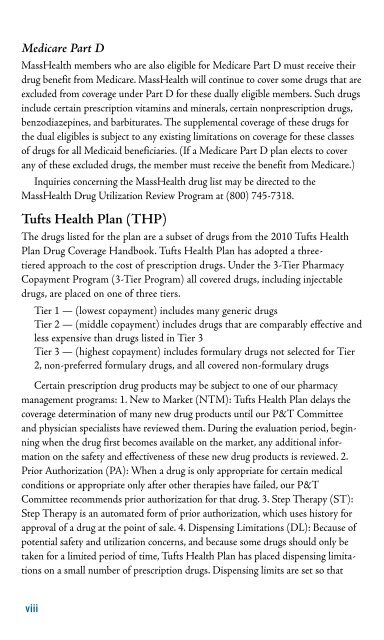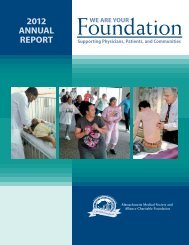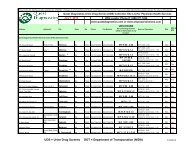To order additional copies, please call Massachusetts Medical
To order additional copies, please call Massachusetts Medical
To order additional copies, please call Massachusetts Medical
You also want an ePaper? Increase the reach of your titles
YUMPU automatically turns print PDFs into web optimized ePapers that Google loves.
Medicare Part D<br />
MassHealth members who are also eligible for Medicare Part D must receive their<br />
drug benefit from Medicare. MassHealth will continue to cover some drugs that are<br />
excluded from coverage under Part D for these dually eligible members. Such drugs<br />
include certain prescription vitamins and minerals, certain nonprescription drugs,<br />
benzodiazepines, and barbiturates. The supplemental coverage of these drugs for<br />
the dual eligibles is subject to any existing limitations on coverage for these classes<br />
of drugs for all Medicaid beneficiaries. (If a Medicare Part D plan elects to cover<br />
any of these excluded drugs, the member must receive the benefit from Medicare.)<br />
Inquiries concerning the MassHealth drug list may be directed to the<br />
MassHealth Drug Utilization Review Program at (800) 745-7318.<br />
Tufts Health Plan (THP)<br />
The drugs listed for the plan are a subset of drugs from the 2010 Tufts Health<br />
Plan Drug Coverage Handbook. Tufts Health Plan has adopted a threetiered<br />
approach to the cost of prescription drugs. Under the 3-Tier Pharmacy<br />
Copayment Program (3-Tier Program) all covered drugs, including injectable<br />
drugs, are placed on one of three tiers.<br />
Tier 1 — (lowest copayment) includes many generic drugs<br />
Tier 2 — (middle copayment) includes drugs that are comparably effective and<br />
less expensive than drugs listed in Tier 3<br />
Tier 3 — (highest copayment) includes formulary drugs not selected for Tier<br />
2, non-preferred formulary drugs, and all covered non-formulary drugs<br />
Certain prescription drug products may be subject to one of our pharmacy<br />
management programs: 1. New to Market (NTM): Tufts Health Plan delays the<br />
coverage determination of many new drug products until our P&T Committee<br />
and physician specialists have reviewed them. During the evaluation period, beginning<br />
when the drug first becomes available on the market, any <strong>additional</strong> information<br />
on the safety and effectiveness of these new drug products is reviewed. 2.<br />
Prior Authorization (PA): When a drug is only appropriate for certain medical<br />
conditions or appropriate only after other therapies have failed, our P&T<br />
Committee recommends prior authorization for that drug. 3. Step Therapy (ST):<br />
Step Therapy is an automated form of prior authorization, which uses history for<br />
approval of a drug at the point of sale. 4. Dispensing Limitations (DL): Because of<br />
potential safety and utilization concerns, and because some drugs should only be<br />
taken for a limited period of time, Tufts Health Plan has placed dispensing limitations<br />
on a small number of prescription drugs. Dispensing limits are set so that<br />
viii






